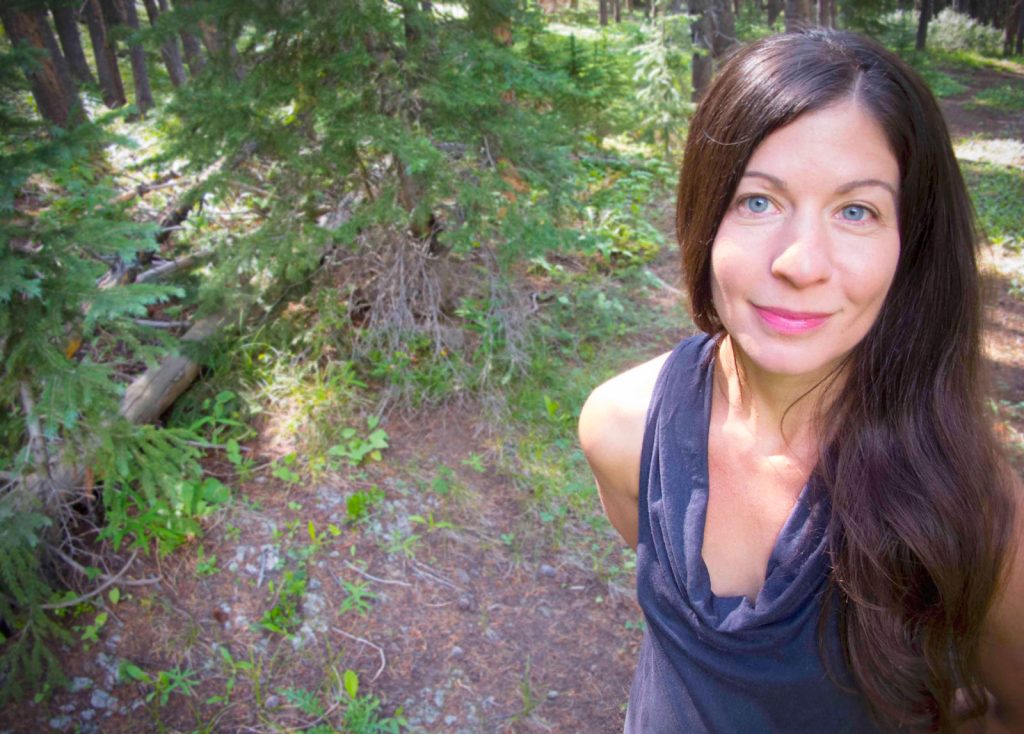“It is all I see,” writes Leah Naomi Green: “a thing, alive, slowly becoming my own body.” Green’s poetry collection The More Extravagant Feast (Graywolf Press; April 7, 2020), winner of the 2019 Walt Whitman Award given by the Academy of American Poets, illuminates her experience of what she calls (inspired by Vietnamese Buddhist monk Thich Nhat Hanh’s teachings) “the reality of interbeing.” In her poems, no barrier intrudes between humans and animals, plants, or mammals. Speaking of her daughter’s birth, she writes, “the seed that is the fruit / that’s already the seed begun / again.”
Green and her family live in an 80-acre ecological village in Virginia, where they grow, hunt, and preserve most of their food. “Living the way that we live has made me aware that the world never weans us,” she said in a phone conversation with Tricycle, “that we are always connected to this source of being fed. The world does the same thing for us that I felt able to do for my daughters when they were inside me.”
In 2014, Green received a grant to write at Plum Village, a monastic center in southern France founded by Thich Nhat Hanh and Buddhist nun Sister Chan Khong. Her pregnancy at the time made abstract principles of Buddhism tangible, as it became impossible for her to answer the question of where her body ended and her child’s body began, she said. The way she and her family live, intimately connected to the systems that sustain us, also makes principles of reincarnation, rebirth, and interbeing real for Green. “It’s apparent to me in the soil that there really would be no life without death,” she explained. “There would be no plants growing if plants weren’t also decomposing. To me, the idea of the more extravagant feast is the realization that the world is always becoming my body, and my body is always becoming the world.”
Green ultimately views poetry, too, as a form of decomposition and regeneration. “Writing poetry allows me to hold suffering or hurt or any strong emotion—even joy—with spaciousness so that I can really look at it,” she said. “Suffering exists—let’s open into that and see where it takes us.”
Read Green’s poem “Arrival,” reprinted below.
***
Arrival
When the moon cast
a shadow for each tree
the same direction
on the snow,
it did not cross
or entangle them.
When you appeared
in the lambent world,
it was not on a long
or wooded walk anywhere,
not dropped or torn
from my waxing belly,
or directly
like royalty
at the bright trumpet
of the operating room,
my troubled form
gone gibbous.
It was before that,
when he and I
rubbed two cells together
because that was what we had.
No, before that too,
and never
was there a moment
when you were not
already
in the motion
of materials—
of love, which we call atoms
because we must
call it something—
turning to the sun,
the seed that is the fruit
that’s already the seed begun
again, my body falling
into its middle.
Your shadow
casts itself now,
discrete from mine,
on the snow.
You’ve come
without arrival
and have made me human,
which is to say animal,
small mammal,
which is to say
that your face, the moon,
is tilted up now
of your own volition, reflecting,
producing, light.
♦
Leah Naomi Green, “Arrival” from The More Extravagant Feast. Copyright © 2020 by Leah Naomi Green. Reprinted with the permission of Graywolf Press, Minneapolis, Minnesota.
Thank you for subscribing to Tricycle! As a nonprofit, we depend on readers like you to keep Buddhist teachings and practices widely available.
